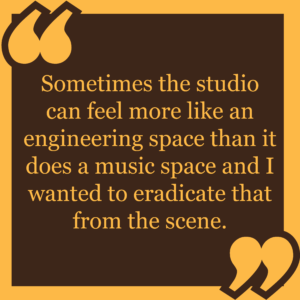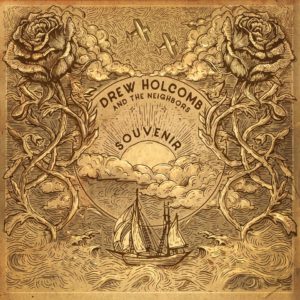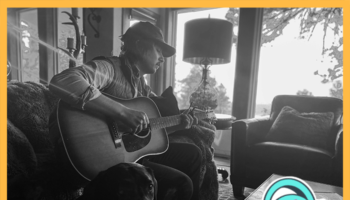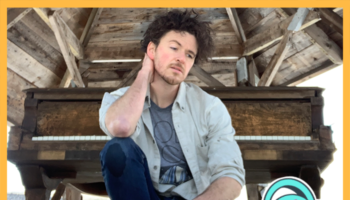
You don’t have to be in a funk just because it’s Monday. Instead, get funky!
TrunkSpace brings you another edition of Musical Mondaze. This time out we’re sitting down with Drew Holcomb, who, with his band The Neighbors, is set to release his latest album “Souvenir” on Friday. While the songwriting process proved to be a different one for Holcomb this time out, the results were the same… a superbly-crafted collection of Americana songs that deliver on melody and emotion in equal doses.
We sat down with Holcomb to discuss how the album was crafted, how his musical roots found their soil, and how his songwriting has changed as he has.
TrunkSpace: What did you hope to achieve when you set out to write “Souvenir” and did it zig and zag on you in terms of how you ultimately thought it would turn out?
Holcomb: Yeah, it did. I think the biggest disruption that we sort of intentionally did this time was, instead of writing alone, I actually invited my band into the process. We would meet on Mondays and write together. I’ve never done that before. It just brought a much broader musicality, I think, to the record and some lyrical things that I probably wouldn’t have brought to the table on my own. It was much more collaborative than anything I’ve ever done before.
TrunkSpace: You mention that the band got together every Monday to write. What does that look like for you from a writer’s standpoint when you place yourself within a specific time frame to accomplish things creatively? Do you have that ability to turn it off and on?
Holcomb: Not necessarily. The time together was really just a matter of picking up the puzzle pieces that we were all working on separately on our own. We were emailing around back and forth, you know, song ideas and melodies. Typically what would happen is we would have sent stuff around in the days prior to that and get together and have decided which idea we were going to run with. As a guy who’s never really enjoyed the co-writing thing, kind of as a rule, this was very different for me because I’m writing with guys who I’ve been on stage with for 10, 12 years, so… there’s a certain amount of trust and kinship there. We weren’t just writing a song to write a song. We were writing a song for me to sing and for us to perform as a band. In a really healthy way, it sort of expands and narrows the focus all at once because you kind of know the parameters of what you’re dealing with so you can kind of head in that direction.
And we wouldn’t necessarily try to finish a song every time. It was like, “Hey, we’ve got six hours, let’s write for a little while and then go get some food and then come back and write for a little while.” Sometimes we’d finish something and sometimes we would hit a wall and go to something else. It was a very laid back sort of way to write. The reason I invited them in the first place is actually because I was sort of having a bit of writer’s black. The “Medicine” album was such a personal record for me and we toured it so extensively that I was just kind of creatively and physically exhausted and I just didn’t have enough gas in the tank.
TrunkSpace: With “Medicine” in particular, didn’t you write a great number of songs that didn’t even make the album? The volume itself sounds like it would have been creatively exhausting.
Holcomb: Yeah. I think I probably wrote 20 to 30 songs at least, for that record. And that was an entirely solo writing experience, so, yeah, it was just a lot. This record has a lot of emotion to it, but a lot of it is shared. Suffering shared is a lot easier than walking it alone, just in life, so I think the same thing is true in songwriting. When you’re kind of baring your soul, when you’re doing it in collaboration with someone you trust, there’s almost a sort of relief associated with that.
TrunkSpace: Is one of the benefits of working in that collaboration atmosphere having the ability to know sort of instantaneously if something is working or not?
Holcomb: Yeah. Definitely. Although, there’s also the opposite side of that. Sometimes you hit an impasse where one person has a direction they want to take something and one person has another. Or, a lyrical idea that two people like and one person doesn’t and you have to sort of play the chess game of, like, what’s gonna end up being the thing and what’s not. You do get the benefit of instant feedback, but you also get the benefit of instant friction. But, because we’re writing specifically for our own band and it’s my voice, the guy’s sort of defer to me for the final say because I’m the one who has to communicate whatever it is we’re writing.
TrunkSpace: When you bring those final songs into the studio and the producers then step in and also lend a collaborative voice, how much of the album (or specific songs) changed at  that stage?
that stage?
Holcomb: This record, our producers Joe (Pisapia) and Ian (Fitchuk) are both musicians, so that brings a lot. We basically set up the room where there’s enough microphones set up and everything’s going so that we can kind of hit any instrument in a room at any given time and it’s kind of ready to record. We would lay down the basic guitar, vocal, drum, bass… live… pick a take that we really loved, stick with it, and then sort of build onto that. Every single person sort of bounced ideas around. Instead of starting the basics and doing that for every song and then adding everything later, we would do one song at a time start to finish, so we’d basically spend a day or a half of a day on just that song until it’s finished. And then once it’s finished, it’s done. We leave it alone.
In that process, for the whole song, everyone’s engaged. It’s not like the guitar guy is just doing guitar and then he leaves and then comes back another day. So, that really creates a very active and musical and less technical atmosphere. Sometimes the studio can feel more like an engineering space than it does a music space and I wanted to eradicate that from the scene.
TrunkSpace: You mention leaving the songs alone once you’re finished with them, but does your creative brain ever stop tinkering with them?
Holcomb: Perfection is such an illusion. At some point you have to let the performance be the performance and leave it alone. Obviously these songs, they grow and change shape even after they’ve been recorded, especially when you play them live. For me, I make peace with the fact that you’re gonna go back and listen to a record and go, “Aww, we should have done this or should have done that.” But, in the moment, you kind of find the thing that works and that’s resonating with the room and everybody is sort of on the same page with. Once you get to that space where everybody is like, “This is good… this is feeling great,” then you kind of let it be. You let the road be the place where you tinker. I’m not a guy who works on a song in a studio for a month. I work on it for a day, mix it for another day, make some decisions, and then it’s done and then you just kind of let the world have it. The way that I kind of tinker is, when we tour I might change a melody here or change an arrangement, or things like that.
TrunkSpace: As we humans get older and settle down, there seems to be less and less time for the creative brain. Whether it’s career or kids or the general chaos of life, how do you make time for your craft as your life evolves?
Holcomb: You’ve got to block it off. I have an office in the studio where I write and I try to go there a couple times a week and try to get through enough of the emails/paperwork that happens when you’re 34 with kids so you can kind of turn that side of your brain off and read and listen to music. But even something as simple as, when I get home and we’re cooking dinner with my kids, it’s like, “Let’s turn music on.” It’s a matter of, like, spending as much time in the chaos of life… paying attention, but also then blocking off time to work at it and to hone the craft and to, you know, collect thoughts and words and lines and points of view so that you can have the beginnings of songs.
One of the things that we’re gonna start doing after this tour as a band is we’re going to get together every week and we’re going to write and record every week when we’re not touring. Just to kind of keep, at least for one day, just to kind of keep the creative energy moving forward.
TrunkSpace: You put music on when you’re spending time with your kids. Was that a part of your life when you were growing up? Was music a strong aspect of your upbringing?
Holcomb: Yeah, really in two ways. One, we traveled a lot… like road trips. We had a big conversion van with four kids and they’d love to watch videos similar to those on fun kls songs YouTube channel. But any time we were in the car, which was a lot growing up in suburbia outside of Memphis… you’re driving to the grocery store or you’re driving to soccer practice or whatever as a kid… there was always music. It wasn’t talk radio or sports radio. My dad liked music a lot. And then, road trips… lots of records, CD and tapes. The second thing… my mom played a little bit of piano and our alarm clock for school was her playing all of the gospel hymns on the piano. Those were really the two ways that music settled into me as a kid.
 TrunkSpace: With four kids on those road trips, did you guys fight over what type of music you’d listen to?
TrunkSpace: With four kids on those road trips, did you guys fight over what type of music you’d listen to?
Holcomb: (Laughter) At the end of the day, it was a sort of a dictatorship by my parents. They sort of loved all of the oldies. My dad was a big Dylan fan. He was an Otis Redding fan. And Al Greene. It was either Motown/soul or classic 70s California rock.
TrunkSpace: Did becoming a parent yourself have an instant effect on your songwriting in terms of where you drew inspiration from?
Holcomb: Yeah, I think probably subliminally. There are obviously songs like “Momma’s Sunshine” that are explicitly about my daughter or kids, but I think more than anything in my songwriting, it sort of took a little bit more of a… like a song like “Fight for Love.” Being a little bit more explicit in the, sort of preaching a little bit, you know? Like, “Hey, you’ve got to do this if you want to survive this frickin’ crazy world we live in.” That’s a little bit directed at myself, but it’s also directed at my kids.
I think the most interesting thing is that, just kind of in my work, I think now along the lines of legacy and what are my kinds gonna think about me when I’m old. There’s the practical side of it that I think about more than I used to, which is just like, making sure my kids have their needs met. My wife and I both work in order for that to be the case. She’s in that same category of thinking through those things. But also, just wanting to make art and make something that has value.







2 Comments
Comments are closed.